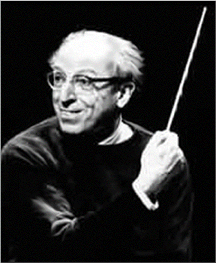 Appalachian Spring – Aaron Copland
Appalachian Spring – Aaron CoplandSince the first time I heard Appalachian Spring until now it has continued to be one of my favorite pieces of symphonic music. For me, it seems to musically describe the America, from rolling plains to jagged mountains, finally settling on the simplicity and beauty of an honest, hard-working life. I always knew that this suite was adapted from Copland’s original ballet, but I knew nothing about the story of the ballet until now. To me, nothing represents the American Dream more than starting your own life with your own family, home, and path. Appalachian Spring is about exactly that—the courtship of two young people about to start anew life together. Knowing this really gave me an increased appreciation for Copland’s work as a representative piece of America.




I thought the NPR did an excellent job of presenting Appalachian Spring as an extraordinary and influential piece of music. My only qualm about NPR’s newscast was their presentation of Aaron Copland. I appreciated the humorous comments made by Copland, but I felt that NPR edited the interviews in such a way that he sounded like he was not purposeful in his composition. Perhaps it is just my romanticized ideals about composers, but I would like to think he composed with an idea and a purpose.

Score from Pscycho - Bernard Hermann
I have always loved film scores. I love how they fuse my two favorite genres of the fine arts—the symphony and the cinema. Psycho is one of my favorite horror films ever made. I have seen it several times, yet it is still chilling, creepy, and horrifying each time I watch it. Just listening to this music again made me think of how creepy the psychosis of Norman Bates really is. Although I knew that Hermann often worked with Hitchcock, I was unaware that they communicated so well and that they had such a good relationship. They understood each other and I find it really interesting that Hermann was able to use his percussive music to relate what Hitchcock wanted.

NPR claims that Psycho represents the perfect union of the audio and the visual—a claim that I completely agree with. It is the music, not the imagery that amplifies the terror in Psycho. Despite the shocking stabbing and near nudity, even the famous shower scene is most remembered for the piercing, striking music. The juxtaposition presented by NPR of this scene without
music and with music shows that it is the music that continues to make people afraid of shower curtains.
Sing, Sing, Sing


I, like many of my age group, probably associate this song most with the famous dancing Chips Ahoy! cookie of television advertising fame, but Sing, Sing, Sing was a timeless classic way before that. When I was little, my mom had a CD with Sing, Sing, Sing on it that I used to listen to a lot. I liked it for the same reason people liked it when it came out—it is exciting and invigorating. I always knew that Sing, Sing, Sing was a popular big band piece, but I was unaware that it was some of thefirst swing music played at Carnegie Hall. Thinking about that kind of music being played in such a highbrow place made me realize that this piece was influential not only in style, but also in bridging the gap between jazz, popular music, and the highbrow community. NPR states that this performance of Sing, Sing, Sing legitimized swing music in the eyes of the general public.

The part of this podcast that I liked the most was probably the
interview with the man who was present at the concert. His description of how the audience was and the effect that Sing, Sing, Sing had on them made me think about what they must have been thinking as they heard this new music. It is interesting that even though it was music uncharacteristic of the venue, the audience was extremely respectful and excited to hear them as a legitimate musical ensemble. I never knew that Sing, Sing, Sing was such an influential piece on American popular culture, but it certainly has more history than just music to accompany swing dancing. One thing is certain: it will always be a classic and a favorite of all—whether the highbrow connoisseur or the Chips Ahoy!-eating common man.
Check out NPR's top 100 most influential American songs here:
No comments:
Post a Comment